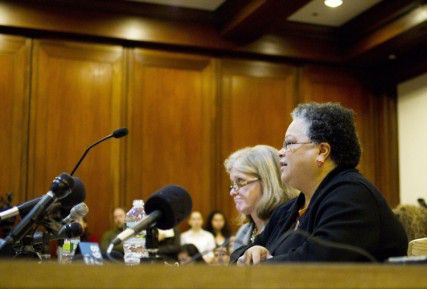Massachusetts lawmakers called for improved oversight for the Framingham Pharmacy linked to a recent nationwide meningitis outbreak at a Statehouse hearing Wednesday, as officials highlighted the failure of pharmacy board members to bring previous violations to light.

State health officials initiated an investigation with the Food and Drug Administration on the New England Compounding Company in September after the report of six fungal meningitis infections in Tennessee, according to an issue brief distributed at a news conference on Wednesday.
Since then, the outbreak has affected 461 patients in 19 states and caused a total of 32 deaths, according to the Center for Disease Control.
“We want to understand how these instances occurred, and what immediate and long-term remedies we should put in place to secure the health and safety of our citizens,” said Rep. Jeffrey Sanchez, of Jamaica Plain, chair of the Joint Committee on Public Health, during a hearing on Wednesday.
Wednesday’s hearing was a joint effort between the House Committee on Post Audit and Oversight, the House Committee on Public Health and the House Committee on Public Safety and Homeland Security.
In response to the crisis, the state has permanently revoked the licenses of NECC and its counterparts Ameridose and Alaunus pharmaceuticals, which share the same ownership.
“This is one of the greatest healthcare tragedies in my memory,” said JudyAnn Bigby, secretary for the Executive Office of Health and Human Services. “These events have uncovered unacceptable breaches on the part of individuals, gaps in regulatory processes and above all a need for immediate and lasting solutions.”
Bigby said the New England Compounding Center was found guilty of several violations upon investigation of the outbreaks.
“NECC knowingly disregarded sterility tests, incurred medicine in unsanitary conditions and violated their pharmacy license,” she said.
The Massachusetts Board of Registration in Pharmacy has also responded with tighter regulation.
“On Nov. 1, the board approved a series of emergency regulations and enhanced monitoring to bring greater scrutiny to this industry,” Bigby said.
In her testimonial, Madeleine Biondolillo, director of the state’s Bureau of Health Care Safety and Quality, reported a history of allegations against the NECC beginning only a year after the compounding pharmacy was first granted its license in 1998.
In 2002, patients were hospitalized with symptoms similar to those of meningitis after receiving steroid injections that allegedly contaminated Methylprednisolone, the same chemical that is said to be the source of the meningitis outbreaks, Biondolillo said in her statement.
In 2004, after several more complaints, the MBP voted to discipline the NECC.
“In September 2004, the Board voted unanimously to sanction NECC with a reprimand, a three-year probation and a requirement that Barry Cadden obtain additional training in sterile compounding,” Biondolillo said. “NECC objected to these sanctions, but the Board reaffirmed this approach through an additional unanimous vote on Nov. 23, 2004.”
In 2006, the MBP made a different non-disciplinary agreement with the NECC, this time requiring only a one-year probation and inspection by the outside corporation Pharmaceuticals Systems Inc., which the NECC passed soon after, Biondolillo said.
Bigby said investigators still do not have specific answers as to why the agreement was changed from 2004 plans.
Biondolillo, too, said the reasons for the switch from disciplinary action to non-disciplinary action are still unknown, which is “gravely concerning.”
“Our investigation has revealed that in late April 2006, some board pharmacy and health professional licensure staff, including the Board’s executive director and legal counseling, learned that PSI executives were convicted of federal crimes related to defrauding the FDA and selling unapproved sterilization equipment,” Biondolillo said.
Biondolillo said there was no evidence that either the executive director or attorney of the board filled Board members in with this information.
Biondolillo added that in 2012, some of the same MBP staff members who did not inform the board about the PSI issues also received a report from the Colorado Board of Pharmacy documenting NECC’s violations of its Colorado and Massachusetts licenses.
The Colorado Board of Pharmacy also issued a cease and desist order in 2011 to stop NECC’s unlawful drug distribution, and in July contacted BOR staff about NECC’s violation of the order.
“However, after receiving the July report and the cease and desist order, both the executive director and legal counsel failed to order an investigation, inform the Board of the complaint or take any other action on the Colorado complaint,” she said.
That such communication would be ignored by a pharmacy with significant compliance issues “absolutely should have raise all kind of red flags,” Biondolillo said.
The next hearing on the issue will take place on Nov. 28 at noon in the State House.
This is an account occasionally used by the Daily Free Press editors to post archived posts from previous iterations of the site or otherwise for special circumstance publications. See authorship info on the byline at the top of the page.



